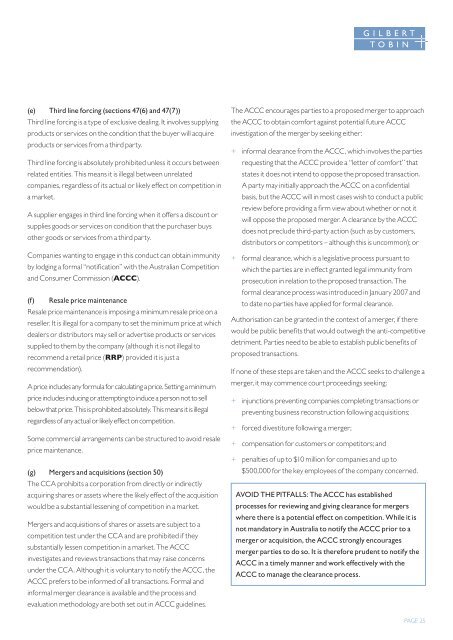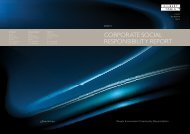Gilbert + tobin
Gilbert + tobin
Gilbert + tobin
- No tags were found...
You also want an ePaper? Increase the reach of your titles
YUMPU automatically turns print PDFs into web optimized ePapers that Google loves.
(e) Third line forcing (sections 47(6) and 47(7))Third line forcing is a type of exclusive dealing. It involves supplyingproducts or services on the condition that the buyer will acquireproducts or services from a third party.Third line forcing is absolutely prohibited unless it occurs betweenrelated entities. This means it is illegal between unrelatedcompanies, regardless of its actual or likely effect on competition ina market.A supplier engages in third line forcing when it offers a discount orsupplies goods or services on condition that the purchaser buysother goods or services from a third party.Companies wanting to engage in this conduct can obtain immunityby lodging a formal “notification” with the Australian Competitionand Consumer Commission (ACCC).(f) Resale price maintenanceResale price maintenance is imposing a minimum resale price on areseller. It is illegal for a company to set the minimum price at whichdealers or distributors may sell or advertise products or servicessupplied to them by the company (although it is not illegal torecommend a retail price (RRP) provided it is just arecommendation).A price includes any formula for calculating a price. Setting a minimumprice includes inducing or attempting to induce a person not to sellbelow that price. This is prohibited absolutely. This means it is illegalregardless of any actual or likely effect on competition.Some commercial arrangements can be structured to avoid resaleprice maintenance.(g) Mergers and acquisitions (section 50)The CCA prohibits a corporation from directly or indirectlyacquiring shares or assets where the likely effect of the acquisitionwould be a substantial lessening of competition in a market.Mergers and acquisitions of shares or assets are subject to acompetition test under the CCA and are prohibited if theysubstantially lessen competition in a market. The ACCCinvestigates and reviews transactions that may raise concernsunder the CCA. Although it is voluntary to notify the ACCC, theACCC prefers to be informed of all transactions. Formal andinformal merger clearance is available and the process andevaluation methodology are both set out in ACCC guidelines.The ACCC encourages parties to a proposed merger to approachthe ACCC to obtain comfort against potential future ACCCinvestigation of the merger by seeking either:+ + informal clearance from the ACCC, which involves the partiesrequesting that the ACCC provide a “letter of comfort” thatstates it does not intend to oppose the proposed transaction.A party may initially approach the ACCC on a confidentialbasis, but the ACCC will in most cases wish to conduct a publicreview before providing a firm view about whether or not itwill oppose the proposed merger. A clearance by the ACCCdoes not preclude third-party action (such as by customers,distributors or competitors – although this is uncommon); or+ + formal clearance, which is a legislative process pursuant towhich the parties are in effect granted legal immunity fromprosecution in relation to the proposed transaction. Theformal clearance process was introduced in January 2007 andto date no parties have applied for formal clearance.Authorisation can be granted in the context of a merger, if therewould be public benefits that would outweigh the anti-competitivedetriment. Parties need to be able to establish public benefits ofproposed transactions.If none of these steps are taken and the ACCC seeks to challenge amerger, it may commence court proceedings seeking:+ + injunctions preventing companies completing transactions orpreventing business reconstruction following acquisitions;+ + forced divestiture following a merger;+ + compensation for customers or competitors; and+ + penalties of up to $10 million for companies and up to$500,000 for the key employees of the company concerned.Avoid the pitfalls: The ACCC has establishedprocesses for reviewing and giving clearance for mergerswhere there is a potential effect on competition. While it isnot mandatory in Australia to notify the ACCC prior to amerger or acquisition, the ACCC strongly encouragesmerger parties to do so. It is therefore prudent to notify theACCC in a timely manner and work effectively with theACCC to manage the clearance process.PAGE 25







